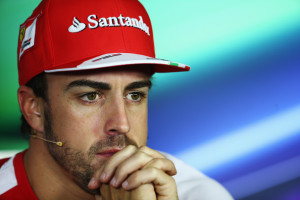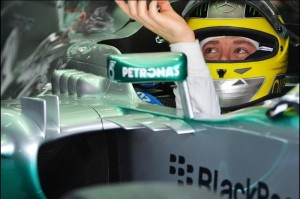
It wasn’t that long ago that the thought of Formula 1 cars under lights was just something the ringmasters were talking about for the future. Now, in 2014, Singapore marks its seventh year on the calendar. It’s no exaggeration to say that after nearly a decade of glittering floodlit F1 cars it still tickles the fancy.
Sebastian Vettel has won the last three Singapore Gp and it isn’t outside the realm of possibility that he could notch up number four. A complete domination, not a Mercedes victory is a given this weekend. Singapore’s Marina Bay circuit has the most corners of all the tracks on the 2014 calendar and its dependence on mechanical grip rather than pure engine power creates the potential for some rivalry. “The demands on the car are very high in terms of braking, steering and also the engine. It’s also a long race – often running to the full two hour limit and frequently characterised by safety cars,” says Paddy Lowe, Mercedes technical director.
The battle between Lewis Hamilton and Nico Rosberg will too recommence. In Italy, Hamilton got the better of Rosberg but the latter still holds a 22 point lead. As proven in Monaco, minus the dubious qualifying incident, Rosberg is no slouch around the street circuits. But the small mistake, that cost him victory at Monza, is the tiniest indication of a crack in the ever polished veneer. As a result Hamilton is in the ascendency where the psychological fight is concerned but it means little if you’re still trailing in the points. However, the Brit and not Rosberg, is the one under more pressure this weekend. Because, unlike Hamilton, never before has Rosberg been lauded as the fastest man in F1, never has he been called a championship contender before this year, and never has he been expected to win simply because of who he is. This all translates to the fact that Rosberg has very little to prove and has far less pressure than megastar Lewis Hamilton.
 Change is abounding in the Ferrari camp as the ubiquitous Luca di Montezemolo has stepped down as President. Montzemolo must be praised for the terrific and tireless job he has done to maintain the team’s legacy. This is another in a long line of significant changes within the Italian team and while all the re-shuffling and re-working and hiring and ‘gardening leave’ is fine and dandy there is still a worry that all the moving and shaking may not pan out where it matters most – on the track.
Change is abounding in the Ferrari camp as the ubiquitous Luca di Montezemolo has stepped down as President. Montzemolo must be praised for the terrific and tireless job he has done to maintain the team’s legacy. This is another in a long line of significant changes within the Italian team and while all the re-shuffling and re-working and hiring and ‘gardening leave’ is fine and dandy there is still a worry that all the moving and shaking may not pan out where it matters most – on the track.
Nevertheless, one of its two drivers, Kimi Raikkonen, is optimistic about a better performance around the Singapore streets. A disastrous home grand prix last time out again drew attention to its dismal power unit and Raikkonen has pointed out the ERS (energy recovery system) as the team’s biggest Achilles heel. However, the less power hungry and more twisty the circuit the better it will play to the Ferrari. “I think the next few circuits will suit us as they’re not so fast. We have to go there and see how the car is, but I expect to be in a stronger position,” says Raikkonen.
One of the things that have always been liked about Formula 1 is its excessive attention to detail. No element or point is too small to escape the hawk-like, near obsessive, meticulousness with which these teams go to work. Recently, this continuous aim towards perfectionism has spilled over to ‘driver coaching.’ We say recently because audiences have only been exposed to radio communications between car and pitwall over the last few seasons.
‘Driver coaching’ has been noted most frequently between the Mercedes drivers and their respective engineers this season. On numerous occasions Hamilton and/or Rosberg would be instructed as to where they could potentially gain time or where they were losing time in comparison to the teammate. No more says the FIA who have clamped down and outlawed all messages that aid driver or car performance. This includes informing a driver about how to manage his fuel consumption.
occasions Hamilton and/or Rosberg would be instructed as to where they could potentially gain time or where they were losing time in comparison to the teammate. No more says the FIA who have clamped down and outlawed all messages that aid driver or car performance. This includes informing a driver about how to manage his fuel consumption.
Long since some have been moaning that the drivers are simply puppets merely following instruction from the pitwall. Now driving will be instinctual rather than a reaction to reams of telemetry data. By golly, they’ll have to think for themselves and it could just improve F1’s image.
Invariably, because F1 employs some of the most brilliant minds in the world there is likely to be coded message passed to the drivers even if the FIA has said these are not allowed. Good news is that we will still here Bonno telling Hamilton that it’s “hammer time” and Kimi Raikkonen will be left alone as he so memorably requested at the 2012 Abu Dhabi grand prix.


